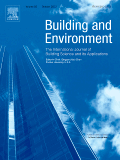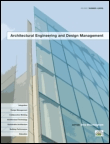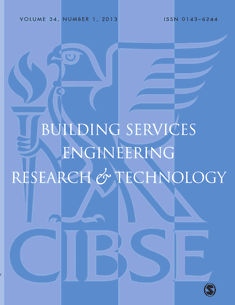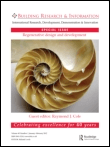
BUILDING AND ENVIRONMENT
Scope & Guideline
Exploring the synergy between construction and environmental stewardship.
Introduction
Aims and Scopes
- Indoor Environmental Quality (IEQ):
Research in this area examines how indoor conditions, including air quality, thermal comfort, lighting, and acoustics, affect occupant health, productivity, and well-being. This includes studies on pollutants, temperature variation, and innovative control systems. - Sustainable Building Practices:
The journal publishes studies on sustainable design, construction materials, and energy-efficient systems. This includes life cycle assessments of building materials, strategies for reducing carbon footprints, and the integration of renewable energy sources. - Thermal Comfort and Energy Efficiency:
A significant focus is on thermal comfort modeling, adaptive behaviors of occupants, and the energy performance of buildings, particularly in varying climatic conditions. Research often evaluates new technologies and methodologies to optimize energy use. - Ventilation and Air Quality:
The journal covers research on ventilation strategies to enhance indoor air quality, control airborne pathogens, and reduce energy consumption. This includes studies on natural ventilation, mechanical systems, and the effects of design on airflow. - Urban Microclimates and Heat Islands:
Research addresses the impacts of urban design on microclimates, particularly the urban heat island effect. Studies explore how vegetation, building morphology, and materials influence local temperatures and energy use. - Human-Building Interaction:
This area focuses on the psychological and physiological responses of occupants to their built environment. It includes studies on user preferences, behavioral adaptations, and the impact of design features on mental health.
Trending and Emerging
- Smart Building Technologies:
There is a growing trend towards the integration of IoT, AI, and machine learning in building management systems. Research explores how these technologies can optimize energy use, enhance occupant comfort, and improve indoor environmental quality. - Health and Wellbeing in Built Environments:
An increasing number of studies focus on the relationship between the built environment and health outcomes, particularly in light of the COVID-19 pandemic. This includes assessments of air quality, thermal comfort, and psychological wellbeing. - Resilience and Adaptation to Climate Change:
Research on building resilience against climate change impacts, including extreme weather events and urban heat islands, is gaining prominence. This area emphasizes adaptive designs and technologies that can mitigate climate-related risks. - Sustainable Urban Design and Green Infrastructure:
An emerging focus is on the role of urban design and green infrastructure in enhancing sustainability and livability in cities. Studies investigate how urban greenery can improve air quality, reduce heat, and promote biodiversity. - Decarbonization in Building Sector:
As global attention shifts towards reducing carbon emissions, research on strategies for decarbonizing the building sector is becoming more prevalent. This includes life cycle assessments and innovative building materials that contribute to lower emissions.
Declining or Waning
- Traditional Building Materials:
Studies focusing solely on conventional building materials without considering the integration of sustainable practices or innovative materials have decreased. There is a growing trend towards exploring alternative materials and methods. - Simple Ventilation Systems:
Research on basic or traditional ventilation systems is becoming less frequent as the focus shifts towards advanced, energy-efficient, and adaptive ventilation strategies that incorporate smart technology and occupant interaction. - Generalized Thermal Comfort Studies:
While thermal comfort remains a key area, generic studies without specific contextual applications or innovative approaches are declining. The emphasis is shifting towards personalized and adaptive models that consider individual differences and dynamic conditions. - Static Energy Efficiency Models:
There is a noticeable decline in studies that propose static models for energy efficiency, as researchers increasingly focus on dynamic, real-time monitoring and predictive models that incorporate occupant behavior and environmental variations.
Similar Journals

Engineering Reports
Empowering the engineering community with cutting-edge discoveries.Engineering Reports is a premier open-access journal published by Wiley, dedicated to advancing the fields of Engineering and Computer Science. Since its inception in 2019, this journal has rapidly gained recognition, achieving a commendable Q2 ranking in both the engineering and computer science categories in 2023, evidencing its impactful contributions to the scientific community. With an impressive Scopus rank of #70/307 in General Engineering and #63/232 in General Computer Science, the journal is well-positioned to disseminate cutting-edge research and foster innovation. Researchers, professionals, and students will find value in its comprehensive scope, which includes emerging technologies and interdisciplinary studies, making it an essential resource for anyone involved in these dynamic fields. Accessible online, Engineering Reports aims to bridge the gap between complex engineering theories and practical applications, enhancing collaboration and knowledge sharing globally.

International Journal of Environment and Sustainable Development
Connecting disciplines for environmental progress.The International Journal of Environment and Sustainable Development, published by INDERSCIENCE ENTERPRISES LTD, serves as a vital platform for researchers, practitioners, and policymakers engaged in the multidisciplinary fields of geography, renewable energy, and environmental sustainability. With an ISSN of 1474-6778 and an E-ISSN of 1478-7466, this journal has been disseminating critical research since its inception in 2002 and continues to expand its scope through 2024. Recognized within the Q3 quartile in Geography, Planning and Development and Q4 in both Management, Monitoring, Policy and Law and Renewable Energy, Sustainability and the Environment, it provides valuable insights into contemporary issues affecting our planet. While access options are limited to non-open access formats, the journal remains essential for those seeking to enhance their understanding of sustainable development practices and policies in a global context. The International Journal of Environment and Sustainable Development is not only an academic repository but also a catalyst for dialogue and innovation within the environmental sciences.

Architectural Engineering and Design Management
Driving efficiency and creativity in architectural engineering.Architectural Engineering and Design Management, published by Taylor & Francis Ltd, is a leading journal dedicated to the interdisciplinary fields of architectural engineering and design management. Since its inception in 2005, the journal has established itself as an essential resource for researchers and practitioners, showcasing the latest developments and innovative practices within the architecture and construction industries. With a commendable impact factor reflected in its Q1 ranking in Architecture and high standings across building and construction, it addresses critical themes such as sustainable design, integrated construction processes, and management strategies that drive efficiency and creativity in evolving architectural contexts. Researchers will find the journal's commitment to disseminating high-quality research—evidenced by its impressive Scopus rankings, including a #13 ranking in Architecture—particularly valuable as it fosters a deeper understanding and advancement in the profession. The journal is accessible in print and online, ensuring that academic and professional communities stay at the forefront of architectural engineering innovation.

Frontiers in Built Environment
Advancing sustainable solutions for urban futures.Frontiers in Built Environment, published by FRONTIERS MEDIA SA, is a highly regarded open-access journal that has established itself as a significant platform for cutting-edge research in the fields of building and construction, geography, planning and development, and urban studies. Since its inception in 2015, this journal has embraced a commitment to disseminating high-quality, peer-reviewed research, allowing researchers, professionals, and students to access pivotal findings and insights without financial barriers. With an impressive 2023 impact factor, it ranks in the Q1 tier for Urban Studies and is positioned within the Q2 tier for both Building and Construction and Geography, Planning and Development, demonstrating its influence and relevance in evolving urban and environmental challenges. Its rigorous indexing, exemplified by a strong Scopus ranking, reflects its contribution to the advancement of knowledge in these critical areas. With a clear dedication to fostering innovation and collaboration within the built environment sector, Frontiers in Built Environment is essential reading for those engaged in shaping sustainable urban futures.

Journal of Building Engineering
Elevating Standards in Building TechnologyWelcome to the Journal of Building Engineering, a premier platform for the dissemination of innovative research in the fields of Architecture, Building and Construction, Civil and Structural Engineering, Mechanics of Materials, and Safety, Risk, Reliability and Quality. Published by ELSEVIER and based in the Netherlands, this journal has solidified its reputation as a leader in the field, proudly achieving a prestigious Q1 ranking across multiple categories as of 2023. With a remarkable impact in Scopus, including being ranked #1 in Architecture and consistently placing within the top 20 in other critical disciplines, the journal is dedicated to fostering high-quality research that addresses contemporary challenges in building technology and engineering practices. The E-ISSN 2352-7102 further facilitates access to groundbreaking articles from 2015 to 2024, making it a vital resource for researchers, industry professionals, and students alike. Embrace the opportunity to engage with cutting-edge studies that not only contribute to academic dialogue but also influence practical applications in the rapidly evolving landscape of building engineering.

International Journal of Built Environment and Sustainability
Transforming Spaces: Where Sustainability Meets DesignInternational Journal of Built Environment and Sustainability, published by PENERBIT UTM PRESS, serves as a pivotal platform for the dissemination of research in the fields of architecture, urban planning, and sustainable development. With an E-ISSN of 2289-8948 and having embraced Open Access since 2014, this journal ensures that critical findings in built environment research are accessible to a global audience, fostering innovation and collaboration among researchers, professionals, and students. Although the H-index and specific scope are currently not detailed, the journal's commitment to advancing sustainable practices in the built environment makes it an invaluable resource for those dedicated to tackling the pressing challenges of sustainability in our communities. As part of its mission, the journal prioritizes high-quality, peer-reviewed articles that contribute to both academic theory and practical applications, solidifying its role in shaping the future of our built environments.

Russian Journal of Building Construction and Architecture
Unlocking Insights for a Resilient Built EnvironmentRussian Journal of Building Construction and Architecture (ISSN: 2542-0526; E-ISSN: 2542-0526), published by the esteemed Voronezh State Technical University, serves as a vital platform for disseminating innovative research and practical applications in the fields of building construction and architecture. This journal, situated in Voronezh, Russia, aims to explore both the theoretical and empirical aspects of contemporary architecture and construction practices, fostering a robust dialogue among researchers, professionals, and academics. With an emphasis on open access to knowledge, the journal significantly contributes to global discourse by ensuring that findings are accessible to a wide audience. Underlining the importance of sustainable development and cutting-edge technologies in construction, the journal strives to publish high-quality research that addresses the challenges faced in today’s building environment, making it an invaluable resource for those committed to advancing the industry.

Building Services Engineering Research & Technology
Pioneering Research for a Sustainable Built EnvironmentBuilding Services Engineering Research & Technology is a leading journal published by SAGE Publications Ltd, dedicated to advancing the field of building services engineering. With an ISSN of 0143-6244 and an E-ISSN of 1477-0849, the journal has established itself as a vital resource since its inception in 1980, operating as an essential platform for disseminating high-quality research and technological innovations up to 2024. The journal is well-respected within the academic community, reflected in its Q2 category ranking in Building and Construction and a commendable 67th percentile rank among the 223 journals in its field, according to Scopus. Although it does not offer open access, it provides extensive insights and rigorous studies that are invaluable for researchers, practitioners, and students alike. As a central hub for the exploration of cutting-edge methods and principles in building services, the journal aims to foster a better understanding of sustainable and innovative practices within the industry.

Gradevinar
Empowering Engineers Through Open Access ResearchGradevinar, published by the Croatian Society of Civil Engineers-HSGI, is a leading Open Access journal in the field of Civil and Structural Engineering, with a significant history that dates back to its inception in 1980. This journal, with the ISSN 0350-2465 and E-ISSN 1333-9095, has established itself as a vital platform for disseminating innovative research and practical developments in civil engineering, particularly since it became Open Access in 2000, facilitating unrestricted access to its wealth of knowledge. As of 2023, Gradevinar is ranked in the third quartile (Q3) of Scopus’s Civil and Structural Engineering category, demonstrating its growing influence and relevance in the academic community, with a current ranking of #255 out of 379 journals in the field. Researchers, professionals, and students benefit from this journal's commitment to high-quality content that reflects the latest advancements and best practices in civil engineering, contributing to both technical proficiency and sustainable development in infrastructure projects across Croatia and beyond.

BUILDING RESEARCH AND INFORMATION
Exploring innovative solutions in Civil and Structural Engineering.BUILDING RESEARCH AND INFORMATION is a premier academic journal dedicated to the advancement of knowledge in the fields of Building and Construction as well as Civil and Structural Engineering. Published by Routledge Journals, Taylor & Francis Ltd, this journal boasts an impressive Q1 ranking in both categories as of 2023, emphasizing its reputation for disseminating high-quality research. Established in 1991, it has continually provided a vital platform for scholarly dialogue on innovative building practices, sustainable construction techniques, and cutting-edge engineering solutions, with ongoing contributions accepted until 2024. The journal is renowned for its extensive insights and interdisciplinary approach, and with a Scopus rank placing it in the 88th percentile for both building and construction engineering and civil and structural engineering, it presents an exceptional opportunity for researchers, professionals, and students to engage with and publish influential findings. While the journal is not open access, it remains a cornerstone for those aiming to deepen their understanding of contemporary challenges and trends in the built environment.